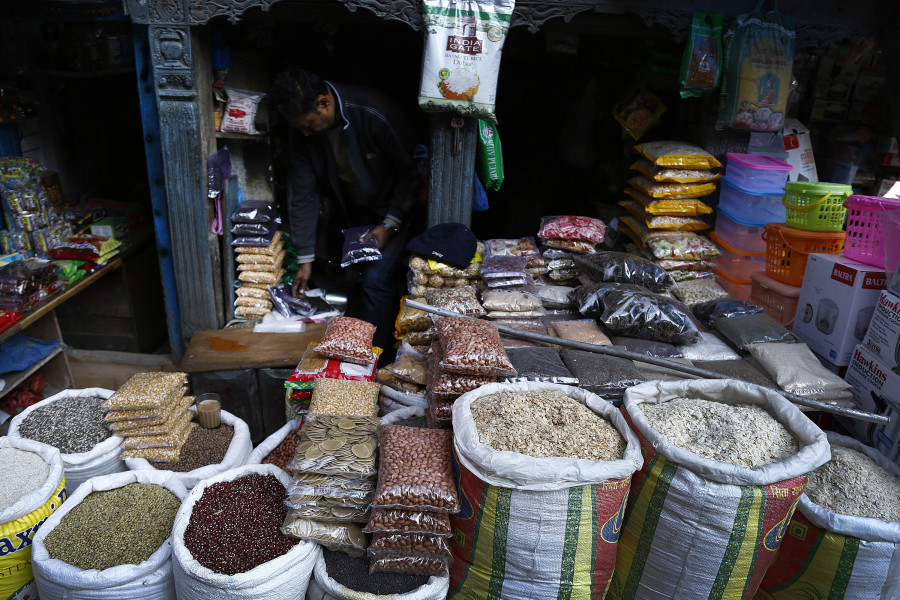Money
With reliance on imports, prices continue to go up
Local production has been declining, leading to increased reliance on imports, merchants say.
Krishana Prasain
Ramesh Gandrama Magar has a job as a driver in a private company, but he is looking for part-time work to make extra money as rising market prices have stretched his salary to the limit.
“My daily expenses have soared as the cost of food and other goods and services, and the rent for my apartment has gone up,” said Magar. “I started feeling the burden of rising prices after the pandemic.”
Till a year ago, the 22-year-old from Dhading was managing to make ends meet; but after the price of all goods swelled in recent months, he started looking for extra work.
“I am looking for a part-time job so I can make extra money to pay the rent, then I will be able to take care of my household expenses with my regular salary,” he said.
Magar earns around Rs22,000 per month out of which he has to feed his family, pay the rent for his apartment at Kalanki, and send money home to his parents in Dhading.
Prices of major kitchen items like rice, edible oil, lentils and legumes have shot up. The price of edible oil has reached an all-time high, according to retailers.
Food started becoming dearer after the Tihar festival in November, and prices continue to rise due to weak market inspection, costlier raw materials in the international market, higher transportation costs and price gouging by opportunist traders, said consumers.
The whole supply chain has been impacted mainly because of lack of strict inspection.
“The price of edible oil has gone up to an unimaginable level,” said Raj Kumar Shrestha, president of the Nepal Retailers Association. "The retail price has reached Rs210 to Rs240 per litre as it costs Rs200 wholesale," he said.
The cost of food items, especially edible oil, has skyrocketed as most of the domestic production is being exported to India where the price has jumped by Rs30 per litre in the past few weeks.
“The price of edible oil is higher in India compared to Nepal, consequently domestic manufacturers are eager to sell their products there, causing shortages in the local market,” he said.
It has been more than two weeks since the price started climbing from Rs185-Rs190. “The price of edible oil is expected to rise further as shipments to the Indian market have increased,” he said.
The price of sunflower and soybean oils in the domestic market has risen by more than 15 percent while there has been only a slight increase in the price of mustard oil.
According to Shrestha, the retail price of food items has increased by 10 percent. The price of rice has increased by Rs50 per 20-kg bag while the price of dried beans has gone up by Rs10 to Rs15 per kg. Lentils have become costlier by Rs10 to Rs15 per kg.
Rice wholesalers say that the price has increased at the source. The dried beans sold in Nepal are imported from New Zealand and Australia, and the lentils from Bhutan, according to traders.
“Domestic production fulfils only 10-15 percent of the current requirement, and the rest have to be imported,” he said. Local output has been declining, leading to increased reliance on imports.
According to Netra Prasad Subedi, director general of the Department of Commerce, Supplies and Consumer Protection, more than 60 percent of the raw materials needed to produce edible oil are imported from third countries.
With the price of raw materials rising in the international market, its direct impact is being seen in the market prices here, he said.
“We came to know that the price of edible oil has increased by Rs15 per litre,” he said. It will take time to normalise the supply of raw material, and it will take time to reduce the price.
He said that there was no problem with the prices of rice and lentils, as they have not increased since they were last raised after the Tihar festival.
According to Subedi, the department has deployed four teams for market inspection. The department has been checking the market prices of products ranging from construction materials to food items, he added.
Opportunist traders have been engaging in price gouging amid the uncertainty in the market. “So we have to check the prices from the retail level to the manufacturers and suppliers. “If anyone is found creating artificial price hikes in the supply chain, we will take action against them,” he said.
Subedi added that production was down, exports were up, and it was unrealistic to expect that all imported goods can be obtained at low prices at all times. The local government needs to be active in market inspection, he said. Consumers should be aware and productive as well, he added.
The prices of construction materials, especially cement and iron and steel, have also increased. Manufacturers say that raw materials have become dearer due to a rise in demand; and as a result, the prices of finished goods have also swelled.
The price of cement has reached Rs700 per bag while iron and steel now cost Rs95 per kg.
The price of chicken has also increased to Rs390 to Rs400 per kg due to short supply, said Bishal Shahi, proprietor of Bishal Chicken Store.
Junga Bahadur BC, president of the Poultry Market Management Association, said that production had declined due to which the price had reached Rs370 per kg wholesale.
“The price is not expected to fall soon,” he said, adding that bird flu would not impact prices as production was already down.




 9.7°C Kathmandu
9.7°C Kathmandu















